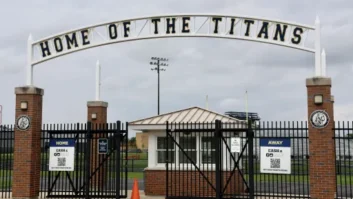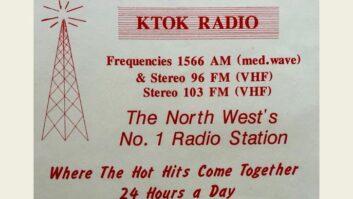In this series Radio World has explored the process by which one organization will be chosen to manage the domain name “dot-radio.” It’s part of the larger expansion of top-level domains undertaken by the Internet Corporation for Assigned Names and Numbers, or ICANN.
RW checked in with a specialist in Internet policy, Kathryn Kleiman, Internet counsel for the law firm Fletcher, Hildreth and Heald PLC. She also is part of the group that founded ICANN in 1999.
Prior to her current post, Kleiman ran her own Internet law and policy firm, Internet Matters, and served as director of policy to dot-org, the Public Interest Registry. Prior to law school, Kleiman helped manage private international data networks on Wall Street.
How will this expansion of the domain name system affect radio stations in the United States and elsewhere? What might it allow businesses to do that they could not before?
A lot of different types of communication are moving online, including broadcasting, and the new TLDs will help create new forms of distribution, branding and communication. To the extent that some of these new forms become successful, U.S. broadcasters may very well want a foothold.
Are you an involved with any of the four potential registries for the top-level domain of dot-radio?
No, I do not represent any of the four applicants.
What privileges and responsibilities will the chosen registry have?
Each dot-radio applicant has laid out its mission and purpose in the ICANN new gTLD application differently. Major sections of the applications are available online at the ICANN website, including the answers to Question 18: Mission/Purpose.
Who does the evaluation?
Hired evaluators are now in the process of reviewing the technical, financial and operational capabilities of the applicant. Running a registry is an important part of the domain name system and critical to the security and stability of the Internet.
After the initial evaluations, questions may be asked, and results will be posted. If all the dot-radio applications are approved to move on past this stage of evaluation, then there are several options. They may talk with each other and try to reach some consensus regarding collective use of dot-radio, they may file oppositions against each other, or they wait out the upcoming opposition period, see who drops out and prepare for auction against those who remain.
A key factor in the dot-radio top level domain contest is the special status of the European Broadcasting Union’s (EBU’s) application. EBU has held itself out to be “a community-designated mark.” It’s interesting because this is a designation with a high standard, and high rewards.
According to ICANN’s New gTLD Applicant Guidebook, those seeking a community designation must show their relationship to their community, their accountability to their community and how members of that community will be register in the top level domain, and how the activates of the registry will serve the community. It’s a high level of showing.
THE BATTLE FOR ‘DOT-RADIO’ Past articles in this series:
Four Apply to Manage ‘Dot-Radio’ Domain Name
Battle for Dot-Radio: Part I (EBU)
Battle for Dot-Radio: Part II (BRS Media)
Battle for Dot-Radio: Part III (Afilias)
Battle for Dot-Radio Part IV (Tin Dale LLC/Donuts Inc.)
I think now would be a very good time for the U.S. radio community to take a close look at the European Broadcasting Union’s application, see if it makes sense and see if it is consistent with the needs and concerns of our U.S. community. It’s also a good idea to talk with the other dot-radio applicants, as you are doing. Should questions arise, this may be an opportunity to seek clarification and changes. Should deep concerns arise, oppositions may be filed through an ICANN process by January 2013 (note: a request for extension of this filing deadline has been filed and is under review).
For those not familiar, what is the business model for a registry; is it a lucrative position to win?
We know that dot-com, dot-org and dot-net are very successful registries. VeriSign, for example, has 103.7 million domain names registered in .com, and 14.8 million in .net.
However, we don’t know how the new gTLD will do. Each applicant is making a bet that it can turn its registry into a lucrative online business. BRS Media, for example, may have a real head start here because it already operates .FM and .AM, and knows the domain name world very well.
Of the applicants for dot-radio, can you handicap who is most likely to get it and why? Will this process reach an auction stage, do you think? What kind of money might be involved, based on precedent?
It’s interesting. As discussed above, of the four dot-radio applications, only one has come in under the “community” designation. According to ICANN rules, if EBU can withstand the close scrutiny of a community application, then it will automatically get “precedence for designation” — it will win. However, if EBU cannot prove to ICANN’s special review panel that it represents the entire community, or if it is successfully challenged by members of community who feel left out of EBU’s application, then EBU might lose its special community designation and status.
If that is the case (and assuming all four applications have passed the technical/operational/financial evaluation), then we would have four equal applications. In that event, the four dot-radio applicants will be given an opportunity to work out matters among themselves (a settlement time).
If they cannot, the four applications would proceed to auction. The dot-radio TLD would then be awarded to the highest bidder.
BRS Media complained that EBU has a conflict of interest in sitting on the ICANN Governmental Advisory Committee. What do you think? And does that argument change the outlook for the EBU application?
It sounds like a very legitimate concern.
As you’ve explained it on your blog, Afilias, Tin Dale and BRS all propose “open registrations,” which would allow anyone to register a second-level domains within dot-radio, for a fee, while the EBU would apply a more restrictive registration policy. Why does it matter?
BRS Media, Afilias and Tin Dale provide a more open platform for a range of new radio services that are developing now and in the future. It is a different version than the EBU application, which will allow registration of domain names to more traditional media, e.g., licensed broadcasters and licensed amateur radio clubs. An open discussion of visions of the future of radio online would be very timely right now.
You’ve also raised the question in your blog about whether EBU is the best representative of the U.S. broadcasting community. What are you hearing from broadcasters about this, if anything?
I spend most of my time in the ICANN rules and meetings, but I wonder and would like to know how much outreach EBU has extended to NAB?
What’s the next step in the ICANN process?
Evaluation panels are meeting now and oppositions can be filed until Jan. 13 (although, as I noted, a request for extension has been filed).
What else should radio broadcasters know about this issue right now?
I encourage U.S. radio broadcasters to get involved: to review the four dot-radio applications, and carefully consider which one would best represent their interests — and their visions of the future of radio online.
What are your feelings about earlier criticisms of the expansion in general?
The expansion of the new top level domain name system comes from a variety of forces: from the technical community, which felt more top level domains could be handled by Internet infrastructure, to the entrepreneurial community, which wants new top level domains for Internet competition, choice and innovation, and to the international community, seeping top level domains in a array of languages and scripts, including Cyrillic, Arabic, Chinese. The last reason may be the most significant driver of new gTLDs at this time.
While some people criticize ICANN for moving too fast, many criticize it for moving too slow. But one way or another, ICANN is moving, and change and expansion are coming to the domain name system. We may many new challenges, but also many new opportunities, ahead. I see a lot of excitement, interest and innovation ahead! We will have new opportunities and challenges ahead.







